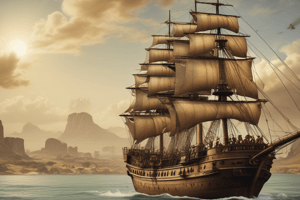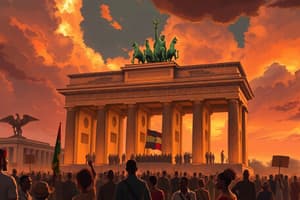Podcast
Questions and Answers
The Berlin Conference of 1884-85 was attended by African representatives.
The Berlin Conference of 1884-85 was attended by African representatives.
False (B)
Patrice Lumumba was the first president of Ghana.
Patrice Lumumba was the first president of Ghana.
False (B)
The Kingdom of Axum was known for its medieval Islamic scholarship.
The Kingdom of Axum was known for its medieval Islamic scholarship.
False (B)
The African National Congress (ANC) was a nationalist movement in Ethiopia.
The African National Congress (ANC) was a nationalist movement in Ethiopia.
The Ras Tafari movement was a nationalist movement in Ghana.
The Ras Tafari movement was a nationalist movement in Ghana.
The Mau Mau uprising was a nationalist movement in South Africa.
The Mau Mau uprising was a nationalist movement in South Africa.
The Scramble for Africa occurred from 1914 to 1881.
The Scramble for Africa occurred from 1914 to 1881.
Ancient Nubia was located in present-day Ethiopia.
Ancient Nubia was located in present-day Ethiopia.
Kwame Nkrumah was the first prime minister of independent Congo.
Kwame Nkrumah was the first prime minister of independent Congo.
The Kingdom of Axum was known for its pyramids.
The Kingdom of Axum was known for its pyramids.
Flashcards are hidden until you start studying
Study Notes
Colonialism
- Scramble for Africa (1881-1914): European powers divided and colonized Africa, exploiting its natural resources and imposing their own systems of government, economy, and culture.
- Berlin Conference (1884-85): European powers established rules for colonizing Africa, with no African representation.
- Effects of colonialism:
- Economic exploitation and underdevelopment
- Cultural suppression and imposition of European values
- Political fragmentation and artificial borders
- Social inequality and racism
Independence Movements
- Pan-Africanism: A movement aiming to unite and empower Africans, promoting self-determination and independence.
- Key figures:
- Kwame Nkrumah (Ghana): First president of an independent African country (1957)
- Julius Nyerere (Tanzania): Led the fight for independence and unity
- Patrice Lumumba (Congo): First prime minister of independent Congo (1960)
- Nationalist movements:
- African National Congress (ANC) in South Africa
- Ras Tafari movement in Ethiopia
- Mau Mau uprising in Kenya
Ancient Kingdoms
- Ancient Nubia (2000 BCE - 300 CE): Located in present-day Sudan, known for pyramids and powerful queens.
- Kingdom of Axum (100 CE - 700 CE): Located in present-day Ethiopia, known for its rich trade networks and architectural achievements.
- Ghana Empire (300 - 1200 CE): Located in present-day Mali, known for its gold trade and medieval Islamic scholarship.
- Mali Empire (1200 - 1500 CE): Founded by Sundiata Keita, known for its powerful kings and extensive trade networks.
Modern Politics
- Post-independence challenges:
- Neocolonialism and economic dependence
- Political instability and authoritarianism
- Ethnic and religious conflicts
- Democratization and reform:
- Multiparty systems and free elections
- Human rights and civil society development
- Economic liberalization and regional integration
- Regional organizations:
- African Union (AU)
- Economic Community of West African States (ECOWAS)
- Southern African Development Community (SADC)
Colonialism
- European powers divided and colonized Africa, exploiting its natural resources and imposing their own systems of government, economy, and culture between 1881 and 1914.
- The Berlin Conference of 1884-85 established rules for colonizing Africa without any African representation.
- Colonialism led to economic exploitation and underdevelopment, cultural suppression and imposition of European values, political fragmentation and artificial borders, and social inequality and racism.
Independence Movements
- Pan-Africanism aimed to unite and empower Africans, promoting self-determination and independence.
- Key figures in the independence movements include Kwame Nkrumah, Julius Nyerere, and Patrice Lumumba.
- Nationalist movements included the African National Congress (ANC) in South Africa, the Ras Tafari movement in Ethiopia, and the Mau Mau uprising in Kenya.
Ancient Kingdoms
- Ancient Nubia (2000 BCE - 300 CE) was located in present-day Sudan and was known for its pyramids and powerful queens.
- The Kingdom of Axum (100 CE - 700 CE) was located in present-day Ethiopia and was known for its rich trade networks and architectural achievements.
- The Ghana Empire (300 - 1200 CE) was located in present-day Mali and was known for its gold trade and medieval Islamic scholarship.
- The Mali Empire (1200 - 1500 CE) was founded by Sundiata Keita and was known for its powerful kings and extensive trade networks.
Modern Politics
- Post-independence challenges included neocolonialism and economic dependence, political instability and authoritarianism, and ethnic and religious conflicts.
- Democratization and reform efforts included the establishment of multiparty systems and free elections, human rights and civil society development, and economic liberalization and regional integration.
- Regional organizations include the African Union (AU), the Economic Community of West African States (ECOWAS), and the Southern African Development Community (SADC).
Studying That Suits You
Use AI to generate personalized quizzes and flashcards to suit your learning preferences.




